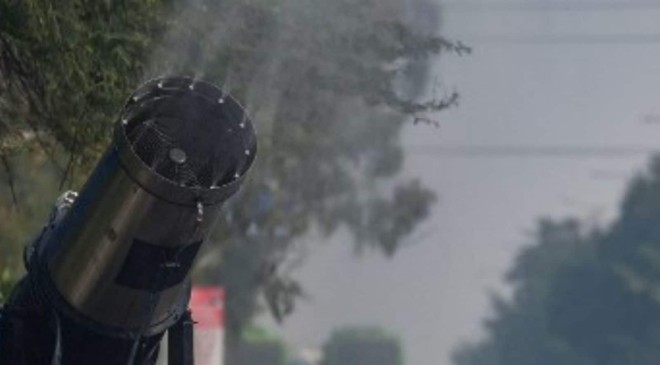Delhi Chief Minister Atishi said the staggered timings for government offices will be introduced in a bid to tackle traffic congestion and reduce pollution levels
A toxic smog enveloped the skies while the air quality remained ‘severe’ for the third consecutive day in the national capital, forcing the Delhi government to review work timings for its employees. Chief Minister Atishi on Friday said the staggered timings for government offices will be introduced in a bid to tackle traffic congestion and reduce pollution levels.
Under the new schedule, the Municipal Corporation of Delhi (MCD) offices will operate from 8.30 am to 5 pm, central government offices from 9 am to 5.30 pm and Delhi government offices from 10 am to 6.30 pm.
In a post on X, Atishi said the move aims to ease vehicular traffic during peak hours. On Friday, the city’s air quality was in the severe category with an AQI of 411.
As the national capital recorded the worst pollution levels in the country, with the air quality being in the ‘severe’ category for two consecutive days, the Commission for Air Quality Management (CAQM) imposed GRAP 3 measures.
Read More: Noida International Airport First Flight Today: Interesting Facts About Jewar Airport
106 Additional Buses, 60 Extra Metro Trips To Fight Air Pollution
As part of the GRAP-3 measures imposed, Delhi environment minister Gopal Rai said an additional 106 cluster buses will ply in the city while Metro trains will make 60 extra trips.
Rai said the air quality index (AQI), which has consistently crossed hazardous levels, led to the enforcement of GRAP-3. “We are working to make GRAP-3 more effective in Delhi,” he said during a press conference.
He held a meeting with officials from the MCD, public works department (PWD), transport, Delhi Transport Corporation (DTC), Metro, and education departments to review and implement urgent measures.
The minister underlined that to reduce vehicular pollution, 106 new cluster bus services have been introduced. Among these, 40 buses have been specifically launched for government employees residing in different parts of the city to discourage the use of private vehicles. The routes will include key areas such as Nehru Place, Rohini, Dwarka, Janakpuri, Shahdara among others.
Read More: GST Council To Hold 55th Meeting On December 21 In Jaisalmer
What Are The Other GRAP-3 Measures Imposed?
As part of the action plan, the Delhi government has banned the entry of non-CNG interstate buses into the city. Only electric buses and those running on CNG will be allowed. In addition, BS-III petrol and BS-IV diesel four-wheelers have been prohibited.
A fine of Rs 20,000 will be imposed on those who breach the new rules and, to ensure enforcement, the transport department has deployed 84 teams with an additional 280 transport police personnel to monitor violations.
Road cleaning efforts will be enhanced with 65 dust suppression machines deployed by the MCD. Moreover, 200 mobile anti-smog guns will be used in three shifts for water sprinkling on roads, with designated drivers in each shift to ensure continuous operations.
The Delhi government is also taking steps to regulate construction activities, banning private construction and demolition works, and restricting non-essential work. Public and government services, however, will continue as usual.
Addressing the media, Rai urged residents to use a cycle for short distances, rely on public transport, carpool, and work from home whenever possible to help reduce pollution levels. If the air quality deteriorates further, he said emergency measures, including artificial rain, will be considered. “We will seek support from the Centre if required,” he added.
The GRAP for Delhi-NCR is divided into four stages of air quality – Stage 1 for ‘poor’ AQI ranging between 201 and 300, Stage 2 for ‘very poor’ AQI of 301-400, Stage 3 for ‘severe’ AQI of 401-450 and Stage 4 for ‘severe plus’ AQI more than 450.
Curbs under the third stage include a ban on non-essential construction and demolition and closure of stone crushers and mining activities in Delhi-NCR. Under the Stage-IV restrictions, all interstate buses from NCR states – except electric vehicles, CNG vehicles and BS-VI diesel buses – will be prohibited from entering Delhi, alongside a stringent ban on construction and demolition activities, suspension of mining-related activities, consideration of shifting to online classes for students up to Class V and daily water sprinkling on major roads.
Read More: Vande Bharat Sleeper Trains: 10 New Sets To Be Launched By Indian Railways By 2025-26
Schools Up to Class 5 Go Online
All schools up to Class 5 in Delhi will switch to online learning till further directions. “Due to rising pollution levels, all primary schools in Delhi will be shifting to online classes, until further directions,” Atishi said on X.
The Directorate of Education (DoE) has asked the heads of all government, private, MCD and New Delhi Municipal Council (NDMC) schools to discontinue offline classes for children up to Class 5.
“All the heads of government, aided and unaided private recognised schools of the DoE, MCD, NDMC in Delhi are hereby directed to discontinue physical classes in schools for children up to Class 5,” it said in a statement.
The DoE has also instructed the heads of schools to ensure classes in online mode for students of these classes till further orders.
(With PTI inputs)





































